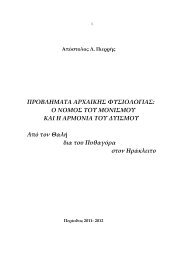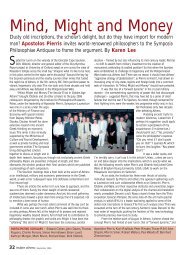Commentary on the Beginning of Damascius' De Primis Principiis
Commentary on the Beginning of Damascius' De Primis Principiis
Commentary on the Beginning of Damascius' De Primis Principiis
Create successful ePaper yourself
Turn your PDF publications into a flip-book with our unique Google optimized e-Paper software.
9But <strong>the</strong>n what is <strong>the</strong> distinctive character ( ἰδιότης) <strong>of</strong> B vis- à-vis A? It is <strong>the</strong>mode in which B “has” (or ra<strong>the</strong>r “is”) what is already in A under a different mode.But granted this, <strong>the</strong> mode under which everything present in A is in B isdifferent from <strong>the</strong> mode under which <strong>the</strong> same is in A, since <strong>the</strong> ἰδιότης <strong>of</strong> B is not,ex hypo<strong>the</strong>si that <strong>of</strong> A. And <strong>the</strong> exasperatingly difficult questi<strong>on</strong> <strong>of</strong> derivati<strong>on</strong> presentsitself in a new, and c<strong>on</strong>nected, form: for how did <strong>the</strong> mode characterizing B comeabout to be present in reality as a reality given <strong>the</strong> mode characterizing A?If to this questi<strong>on</strong> we reply by positing not <strong>on</strong>ly (<strong>the</strong> c<strong>on</strong>tent <strong>of</strong>) B, but <strong>the</strong>specific mode B itself in A, we <strong>on</strong>ly begin an infinite regress. Ano<strong>the</strong>r answer should,<strong>the</strong>refore, be sought.It is premature, as we said, to pursue fur<strong>the</strong>r <strong>the</strong>se questi<strong>on</strong>s which lie right in<strong>the</strong> metaphysical heart <strong>of</strong> Neoplat<strong>on</strong>ism. But enough has been said, in order toappreciate D.’s point in <strong>the</strong> passage in questi<strong>on</strong>. The One can be <strong>the</strong> source <strong>of</strong> πάντα(πάντα ἀπ᾿ αὐτοῦ 3.3), just because it itself is πάντα before πάντα.Thus, for D., <strong>the</strong> One is not just and <strong>on</strong>ly <strong>on</strong>e; it is πάντα; it must be πάντα inorder to be able to “generate” πάντα. And so we meet here with a major modificati<strong>on</strong><strong>of</strong> Neoplat<strong>on</strong>ic doctrine, <strong>the</strong> full significance <strong>of</strong> which will become apparent later [15].2.19. ἐξεφάνη: ἐκφαίνεσθαι is regularly used by Neoplat<strong>on</strong>ists to signify firstappearance or presence in reality <strong>of</strong> a certain character, in most cases in c<strong>on</strong>necti<strong>on</strong>with <strong>the</strong> questi<strong>on</strong>: where did X first appeared in <strong>the</strong> Chain <strong>of</strong> Reality = which is <strong>the</strong>precise locati<strong>on</strong> <strong>of</strong> <strong>the</strong> X-reality in <strong>the</strong> ordered derivati<strong>on</strong> <strong>of</strong> all reality from <strong>the</strong>Ultimate Principle down to <strong>the</strong> thre shold to unreality. Cf. <strong>the</strong> orphic use <strong>of</strong> <strong>the</strong> termand <strong>the</strong> orphic Phanes.3.1. Σπεύσιππος. Here we have a good opportunity <strong>of</strong> showing, in a specificcase, how near <strong>the</strong> Neoplat<strong>on</strong>ic speculati<strong>on</strong>s were (in respect to <strong>the</strong> kind <strong>of</strong> problemsfaced, and in <strong>the</strong> spirit <strong>of</strong> <strong>the</strong> answers given, as well as in many details <strong>of</strong> <strong>the</strong>soluti<strong>on</strong>s <strong>of</strong>fered) to <strong>the</strong> c<strong>on</strong>troversies in <strong>the</strong> Old Academy.Speusippus distinguished <strong>the</strong> One, <strong>the</strong> Νοῦς (which was <strong>the</strong> God for himproperly speaking) and <strong>the</strong> Good [ 16]. In fact he was pr<strong>on</strong>e to multiply hypostases(= levels <strong>of</strong> being) and <strong>the</strong>ir principles; which makes Aristotle complain that in thisway no coherent view <strong>of</strong> <strong>the</strong> World can be made [17]. C<strong>on</strong>trary to Plato [18] ando<strong>the</strong>r Plat<strong>on</strong>ist s who found in <strong>the</strong> One <strong>the</strong> very nature <strong>of</strong> <strong>the</strong> Good, Speusippusseparated <strong>the</strong>m [19]. In fact we are fortunately able to know <strong>the</strong> reas<strong>on</strong> why h e did










